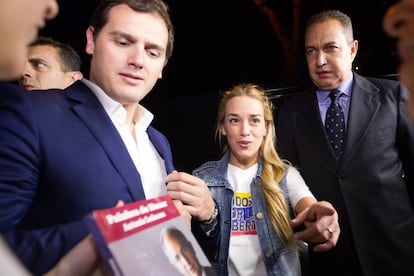Venezuela and Spain’s general election
The main political parties are making their positions clear about the crisis in the South American country

The recent visits to Venezuela by former Spanish Prime Minister José Luis Rodríguez Zapatero and Albert Rivera, the head of Ciudadanos, has obliged Spain’s parties to make their position clear regarding the crisis in the South American nation. The Popular Party (PP), the Socialists (PSOE), and Ciudadanos have all expressed their support for democracy and against the imprisonment of opponents of President Nicolás Maduro. Meanwhile, Unidos Podemos, the new coalition between the Communist Party-led United Left and anti-austerity grouping Podemos, has backed the Venezuelan government, insinuating that opposition leader Leopoldo López, who has been in prison for several months following a show trial organized by the government, is a coup leader.
Some commentators have questioned the visits to Caracas in the run up to the June 26 elections, but the trips are entirely justified. The Socialist Party’s Zapatero went there to mediate between the government and the opposition; Rivera was invited to speak by the country’s opposition-controlled National Assembly. On both occasions, the visits have been backed by the Spanish embassy in Caracas. In any event, it is perfectly legitimate for candidates in the Spanish elections to discuss the situation in a country that is clearly of interest to Spain.
The situation in Venezuela is sufficiently serious as to require Spain’s political parties to make their position clear: following elections in which the overwhelming majority of voters backed the opposition, President Maduro has dug in, backed by the judiciary and armed forces that for the moment he controls. In the meantime, the country is sinking deeper and deeper into poverty and violence.
President Maduro has dug in, backed by the judiciary and armed forces that for the moment he controls. In the meantime, the country is sinking deeper and deeper into poverty and violence
In response, Mariano Rajoy, Spain’s acting prime minister (in the form of an article in EL PAÍS), along with Rodríguez Zapatero and Albert Rivera (through their visits to Caracas), have done what might be expected of three leaders who defend democracy: highlight the situation in Venezuela and express their support for an electorate that has voted for change and is suffering the consequences of a totalitarian regime that locks up dissidents and has led the country to the brink of ruin.
The recently created coalition between the Communist Party-led United Left and anti-austerity party Podemos supports Maduro, as its leadership has done all along. We should remember that Podemos’s leader Pablo Iglesias voted in the European Parliament last year against a call for opposition leaders to be freed. His new partner, Alberto Garzón, has backed Maduro’s description of Leopoldo López as a coup leader, while Iglesias has said that the law must be respected.
The position of Spain’s political parties is clear: the only question is whether Podemos is defending the regime created by Hugo Chávez (its leadership worked for it for several years), or out of fear that a change of position would prompt Maduro to say how many millions his government has handed over to the party since its foundation. If Podemos’s leadership believes in transparency, it should address this question immediately.
English version by Nick Lyne.
Sign up for our newsletter
EL PAÍS English Edition has launched a weekly newsletter. Sign up today to receive a selection of our best stories in your inbox every Saturday morning. For full details about how to subscribe, click here.
Tu suscripción se está usando en otro dispositivo
¿Quieres añadir otro usuario a tu suscripción?
Si continúas leyendo en este dispositivo, no se podrá leer en el otro.
FlechaTu suscripción se está usando en otro dispositivo y solo puedes acceder a EL PAÍS desde un dispositivo a la vez.
Si quieres compartir tu cuenta, cambia tu suscripción a la modalidad Premium, así podrás añadir otro usuario. Cada uno accederá con su propia cuenta de email, lo que os permitirá personalizar vuestra experiencia en EL PAÍS.
¿Tienes una suscripción de empresa? Accede aquí para contratar más cuentas.
En el caso de no saber quién está usando tu cuenta, te recomendamos cambiar tu contraseña aquí.
Si decides continuar compartiendo tu cuenta, este mensaje se mostrará en tu dispositivo y en el de la otra persona que está usando tu cuenta de forma indefinida, afectando a tu experiencia de lectura. Puedes consultar aquí los términos y condiciones de la suscripción digital.








































